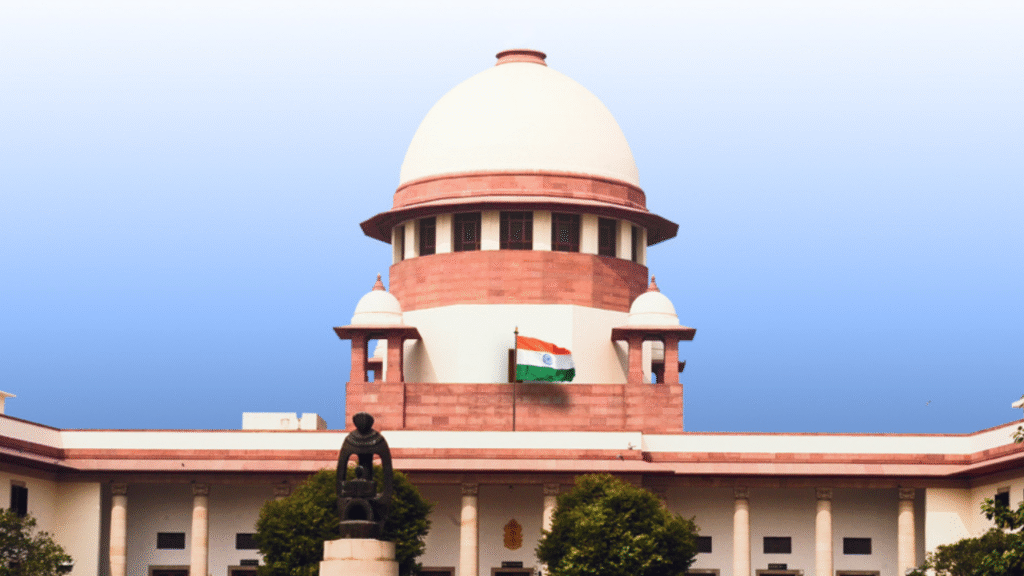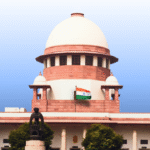Constitution of India – Article 21, 32 & 141 – Code of Criminal Procedure, 1973 – Section 174 – (Bharatiya Nagarik Suraksha Sanhita, 2023 – Section 194) – Penal Code, 1860 – Section 302/120 – Investigation – Transfer to Central Bureau of Investigation (CBI) – Unnatural Death of Student – Medical Negligence – Suspicious Circumstances – Ineffective Local Police Investigation – Public Law – Mental Health – Right to Life – Student Suicides – Systemic Failure – Interim Guidelines for Educational Institutions.
(2025) 7 SCD 76 : 2025 INSC 893
IN THE SUPREME COURT OF INDIA
CRIMINAL APPELLATE JURISDICTION
CRIMINAL APPEAL NO(S). OF 2025; July 25, 2025
(Arising out of SLP (Crl.) No (s). 6378 of 2024)
SUKDEB SAHA v. THE STATE OF ANDHRA PRADESH & ORS.
Coram: Mehta, J. (and Vikram Nath, J.)
I. CRIMINAL PROCEDURE – INVESTIGATION – TRANSFER TO CENTRAL BUREAU OF INVESTIGATION (CBI) – UNNATURAL DEATH OF STUDENT – SECTION 174 CrPC (now Section 194 BNSS, 2023) – SECTION 302/120 IPC (now BNS) – MEDICAL NEGLIGENCE – SUSPICIOUS CIRCUMSTANCES – INEFFECTIVE LOCAL POLICE INVESTIGATION.
Facts: The appellant’s 17-year-old daughter, Ms. X, died an unnatural death while undergoing NEET coaching and staying in a hostel in Visakhapatnam. The High Court rejected the appellant’s prayer to transfer the investigation of the FIR (originally registered under Section 174 CrPC, later Section 302/120 IPC) to the CBI, citing two FIRs in different states as beyond its jurisdiction.
Held: The Supreme Court quashed and set aside the High Court’s order, directing the transfer of the investigation to the CBI.
Reasoning:
Power to transfer to CBI is extraordinary, to be exercised sparingly, cautiously, and in rare and exceptional circumstances where compelling necessity arises to ensure fairness, public confidence, and protection of fundamental rights. Mere dissatisfaction is not enough.
The Court found the ineffectiveness of the local police officials clear and undeniable, citing several compelling factors demonstrating investigation failure:
Unsubstantiated Suicide Theory: No suicide note, psychological history, or corroborating statements/records were found to support the belated suicide narrative put forth by respondents.
Glaring CCTV Contradictions: Footage from the hostel showed Ms. X in salwar/trousers, while footage from an adjacent shop at the alleged time of fall showed a girl in blue half-pants and a T-shirt. The Investigating Officers failed to reconcile this fundamental inconsistency or verify identity through forensic/DNA analysis or witness identification.
Contradictory Patient Condition: Respondents claimed Ms. X was unconscious, but the AIIMS Medical Board Report and eyewitness accounts confirmed she was conscious and irritable (Glasgow Coma Scale score of 10/15) upon hospital admission and even asked for water. The failure to record her statement despite her conscious state indicated gross medical negligence and possible suppression of key evidence.
Conflict of Interest: The same medical officer functioned as the autopsy surgeon, chemical analyst, and a member of the post-incident internal inquiry committee, compromising independence and integrity.
Premature Destruction of Viscera: Critical forensic evidence (viscera) was destroyed “after analysis” by RFSL, Visakhapatnam, despite a High Court order for DNA testing, undermining the investigation’s integrity and precluding conclusive determination of cause of death.
Inconsistent Autopsy Findings: The presence of semi-digested rice and a “suspicious smell” in the stomach nearly 48 hours after the incident was irreconcilable with the claim that Ms. X was on continuous ventilatory support from the early hours of July 15, 2023. There is no accepted protocol for feeding solid rice to a mechanically ventilated patient.
Withholding of Vital Forensic Reports: The Chemical Analysis Report of viscera and the final opinion on the cause of death were not placed on record, suggesting a deliberate attempt to conceal evidence.
The collective facts indicated exceptional complexity and a potential deeper malaise in the investigational process, making CBI intervention not only justified but essential to preserve justice, restore public confidence, and ensure accountability.
Directions for Investigation: The entire case records, including all relevant papers, documents, CCTV footage, and forensic reports, shall be handed over to the CBI forthwith. The CBI Director shall ensure immediate registration of an RC and assign the investigation to a team of competent officials, with a report to be submitted within four months.
II. PUBLIC LAW – MENTAL HEALTH – RIGHT TO LIFE – ARTICLE 21 OF THE CONSTITUTION OF INDIA – STUDENT SUICIDES – SYSTEMIC FAILURE – INTERIM GUIDELINES FOR EDUCATIONAL INSTITUTIONS – ARTICLE 32 & 141 OF THE CONSTITUTION OF INDIA.
Context: The Court took judicial notice of the deepening crisis of student suicides in educational institutions, including schools, coaching institutes, colleges, and training centres, noting a distressing pattern of rising student suicides (e.g., 13,044 student suicides in 2022, with 2,248 attributed to examination failure). This reflects a systemic failure in addressing psychological distress, academic burden, and institutional insensitivity.
Legal Basis for Intervention:
Mental health is an integral component of the right to life under Article 21 of the Constitution, encompassing dignity, autonomy, and well-being.
The Mental Healthcare Act, 2017, and India’s obligations under international human rights instruments (e.g., ICESCR, CRPD) reinforce the imperative to protect and promote mental health and prevent suicide.
Despite existing initiatives (UMMEED, MANODARPAN, National Suicide Prevention Strategy) and the ongoing work of a National Task Force, a legislative and regulatory vacuum persists for a unified, enforceable framework for student suicide prevention.
In light of this pressing crisis, the Court, exercising powers under Article 32 and treating this pronouncement as law declared under Article 141 (akin to the Vishaka Guidelines), issued immediate interim safeguards.
Key Guidelines for Educational Institutions (including coaching centres, residential academies, and hostels):
Uniform Mental Health Policy: Adopt and implement, reviewed annually and publicly accessible.
Qualified Counsellors: Appoint/engage at least one qualified counsellor/psychologist/social worker for institutions with 100+ students; smaller institutions to establish formal referral linkages.
Optimal Student-to-Counsellor Ratios: Assign dedicated mentors/counsellors to smaller batches, especially during examination periods and academic transitions.
Avoid Harmful Academic Practices: Refrain from batch segregation based on academic performance, public shaming, or disproportionate academic targets.
Immediate Referral Protocols: Establish written protocols for mental health services, local hospitals, and suicide prevention helplines, with prominent display of helpline numbers.
Mandatory Staff Training: All staff must undergo mandatory twice-yearly training on psychological first-aid, warning signs, and referral mechanisms.
Sensitive Engagement with Vulnerable Students: Staff must be trained to engage sensitively and non-discriminatorily with students from vulnerable and marginalised backgrounds (e.g., SC, ST, OBC, EWS, LGBTQ+, disabled).
Robust Harassment Reporting & Redressal: Establish confidential mechanisms for reporting sexual assault, harassment, ragging, and bullying, with internal committees to take immediate action and provide psychosocial support. Institutional culpability will be assigned for failure to take timely/adequate action where such neglect contributes to student self-harm or suicide.
Parent Sensitization: Regularly organise programmes for parents to avoid undue academic pressure and recognise signs of psychological distress.
Prioritise Extracurricular Activities: Review examination patterns to reduce academic burden and cultivate a broader sense of identity.
Structured Career Counselling: Provide regular, structured career counselling to reduce unrealistic academic pressure and promote diverse pathways.
Safe Residential Environments: Hostel owners/wardens must ensure campuses are free from harassment, bullying, and harmful substances.
Safety Devices in Residential Institutions: Install tamper-proof ceiling fans or equivalent safety devices and restrict access to high-risk areas like rooftops/balconies to deter impulsive self-harm.
Heightened Protections in Coaching Hubs: Implement special mental health protections and preventive measures in cities with high incidents of student suicides (e.g., Kota, Jaipur, Sikar, Chennai, Hyderabad, Delhi, Mumbai).
Applicability & Nature: These guidelines apply to all educational institutions across India (public/private schools, colleges, universities, training centres, coaching institutes, residential academies, and hostels) and are interim, complementing the ongoing work of the National Task Force.
Directions for Implementation:
All States and Union Territories shall notify rules within two months for mandating registration, student protection norms, and grievance redressal mechanisms for all private coaching centres, ensuring compliance with these mental health safeguards.
A district-level monitoring committee shall be constituted in each district, chaired by the District Magistrate or Collector, to oversee implementation, conduct inspections, and receive complaints.
The Union of India is directed to file a compliance affidavit before the Court within 90 days, detailing implementation steps, coordination mechanisms, status of regulatory rulemaking, and monitoring systems.
The judgment copy is to be circulated to relevant ministries and Chief Secretaries for immediate compliance.
The appeal was disposed of, with the case listed again on October 27, 2025, for receiving the compliance report.


